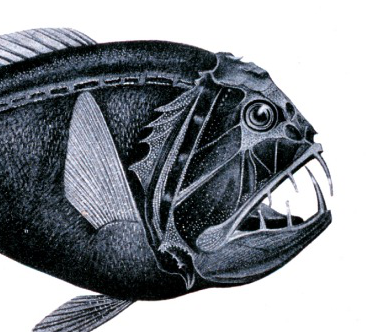Mitchell, A., Hayes, C., Booth, D. J., & Nagelkerken, I. (2023). Projected ocean acidification and seasonal temperature alter the behaviour and growth of a range extending tropical fish. Coral Reefs. https://doi.org/10.1007/s00338-023-02396-2
Tropical vagrants
Do you ever wish you could fly to a winter wonderland to escape the scorching hot summer? Fish have the same sort of idea. In the face of climate change, tropical reef fish are moving north into temperate regions to avoid warming ocean temperatures. This is referred to as the tropicalization of temperate reefs, which now often exhibit water temperatures closer to what tropical fishes are used to during the summer months. Tropicalization is causing a profound shift in the types of species and interactions in temperate areas. For example, tropical fishes often form shoals, or large groups, with resident temperate fishes. This allows tropical fish vagrants to find food easier and stay better protected from predators.
In the summer, tropical species thrive in temperate ecosystems. Colder temperatures in the winter, however, can cause huge die-offs of the new inhabitants if temperatures drop too low. This may change as future ocean temperatures are projected to increase year-round. In essence, temporary tropical species may become permanent residents in temperate regions, permanently altering community structures.
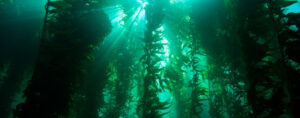
Further impacting the behavior of tropical fishes in temperate regions is ocean acidification, which is the absorption of excess atmospheric carbon dioxide (CO2) by the ocean that causes increased acidity. Acidification can result in behavioral challenges for fish, including lower predator detection capabilities and difficulty finding suitable habitats.
As ocean temperatures and CO2 levels are projected to rise, it’s critical to understand what this means for vagrant tropical fish and the temperate residents they infiltrate. To shed light on the future rate of tropicalization, researchers designed a laboratory experiment to test the combined effects of ocean warming and acidification on the behavior and growth of tropical vagrant fish and resident temperate fish.
Laboratory experiments
Scientists collected 60 Indo-Pacific sergeant fish (Abudefduf vaigiensis) and 180 Australian mado fish (Atypichthys strigatus). Tropical reef fish A. vaigiensis are often seen shoaling with temperate reef fish A. strigatus. Back at the lab, they ran a series of experiments on fish pairs with a combination of 1) current or projected future pH levels and 2) current or projected future seasonal temperatures (i.e., summer or winter). Fish pairs were either 1 tropical and 1 temperate fish or 2 temperate fish. Each pair was exposed to the climate treatments for no more than 40 days. At the beginning and end of the experiment, researchers measured body length and mass of each fish.
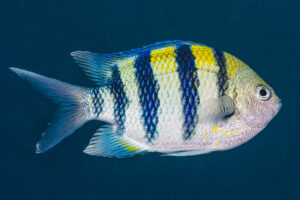
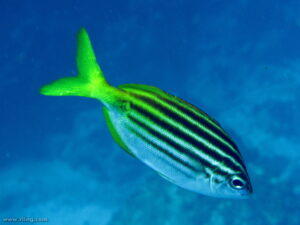
On days 19 and 27, they analyzed video recordings of their behavior with a focus on aggressive acts towards each other (“aggression”), swimming (“activity”), bites taken (“feeding”), and feeding response lag (“boldness”).
Coexist or outcompete?
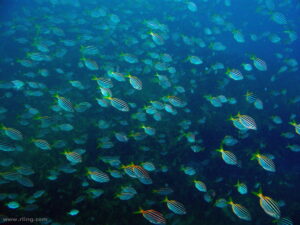
The scientists found that future winter temperatures greatly boosted the growth of temperate fish (>200%) while decreasing that of tropical fish (–70%). Temperate fish behavior was unaffected by the climate treatments while tropical fish were 64% less aggressive, 52% less bold, and fed 45% less under future winter temperatures compared to current summer temperatures. During future summer temperatures, tropical fish were 4% more active and 90% more aggressive, potentially giving tropical fish the upper hand in warmer temperatures. Temperate fish behavior was unaffected by the climate treatments. Under projected ocean acidification levels, tropical fish were 3% more active. The three other behaviors and growth rates along with temperate fish growth rates and behaviors were unaffected by projected ocean acidification.
The researchers concluded that projected winter conditions are the cold-range limit of tropical fish and will reduce the performance of tropical vagrants, ultimately slowing the rate of tropicalization. Seasonal temperature changes alternate favoring temperate and tropical fishes, meaning coexistence of these species in the future is likely. Knowing how temperate and tropical reef community structures may shift is crucial for implementing successful conservation strategies and management approaches.
Cover photo by François Libert, CC BY-NC-SA 2.0.

I’m an MSc student in marine biology at the University of Hawaiʻi at Mānoa. I conduct research through the Johansen Fish Resilience Lab at the Hawaiʻi Institute of Marine Biology. I’m currently studying the effects of sedimentation on the foraging behavior of herbivorous coral reef fish. Before grad school, I got a double BS in environmental geology and environmental studies at Tufts University before working at a shark research lab in the Bahamas. In my free time, you can find me climbing, running, or reading at the beach.
